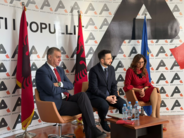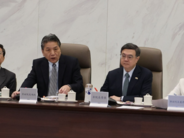Date of article: 05/01/2026
Daily News of: 09/01/2026
Country:  Bulgaria
Bulgaria
Author:
Article language: en
The Ombudsman of the Republic of Bulgaria, Velislava Delcheva, successfully defended the reaccreditation of the national human rights institution with the highest possible "A" status according to the Paris Principles. The decision was taken at the last session of the UN Subcommittee on Accreditation (SCA) for 2025, of which the institution was officially notified by letter from the European Network of National Human Rights Institutions (ENNHRI).
Status "A" means that the ombudsman institution meets the highest international standards for independence, impartiality, pluralism, transparency, and the broadest possible mandate in the protection and promotion of human rights. It certifies the institution's full compliance with the Paris Principles – the fundamental international standard for the functioning of national human rights institutions. At the same time, the UN Subcommittee on Accreditation notes that the new legal provision allowing the Ombudsman or Deputy Ombudsman to assume the functions of caretaker Prime Minister could affect the reputation and actual independence of the national human rights institution. The UN Subcommittee recommends that the Ombudsman continue to advocate for amendments to Article 99(5) of the Constitution of the Republic of Bulgaria and Article 14(1) of the Ombudsman Act in order to remove the provision under which the Ombudsman and Deputy Ombudsman may be appointed as caretaker Prime Minister.
Accreditation with "A" status allows the national human rights institution to raise issues of national importance before the highest international human rights forums and to participate actively in the formation of international policies and standards in the field of human rights. The Ombudsman can participate fully in the work of the UN human rights committees and the Human Rights Council, express positions, and raise issues related to the rights and freedoms of citizens of the Republic of Bulgaria. Only 20 European Union member states have a national human rights institution with such status.
When it was established in 2005, the Ombudsman Institution was accredited with "B" status following an assessment by the UN Subcommittee on Accreditation. In 2011, the international organization made specific recommendations to strengthen its independence and expand its mandate. As a result of successive legislative changes adopted by the National Assembly in 2018, the Ombudsman was explicitly established as the national human rights institution in Bulgaria, with expanded powers, including with regard to violations committed by private law entities.
After implementing all of the Subcommittee's recommendations, in March 2019, the Bulgarian Ombudsman received the highest "A" status for the first time. In October 2025, this status was successfully defended by Ombudsman Velislava Delcheva after a hearing before a commission in Geneva, confirming the sustainability, independence, and effectiveness of the institution.
In its official letter, ENNHRI highly appreciates the professionalism, consistency, and commitment of the Ombudsman's team and expresses its confidence that the reaccreditation will contribute to even stronger protection and promotion of human rights in Bulgaria. The European Network also declares its readiness to continue supporting the Institution in implementing the Subcommittee's recommendations and in its future international cooperation.
 Georgia
Georgia











